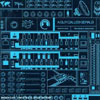 His most relevant work in what seems like ages, Gerald Simpson's latest matches the feverish vitality of the early acid house era without resorting to Vibertian schtick or pure retro reproduction.
His most relevant work in what seems like ages, Gerald Simpson's latest matches the feverish vitality of the early acid house era without resorting to Vibertian schtick or pure retro reproduction.
The reductionist Proto-Acid, a 71-minute storm of bleeps, bass, and beats, plays like a distant cousin to Simpson's classic "Voodoo Ray" and his recordings with the once-mighty 808 State, as well as the Motor City innovators that made these classic works possible. Produced live on two laptops and a mixer without any additional hardware, it thoughtfully re-imagines techno as if in an alternate timeline, one in which the rave scene's dumbed-down degeneracy and laughable neo-hippy nonsense never materialized. The results of this endeavor wont find their way into the record crates or hard drives of posturing celebrity DJs playing for sweaty meatheads and obnoxious bimbos across the globe, nor will they play to the demographic needs of trendy advertising agencies. This is, unquestionably, to Simpson's credit.
Opening with the bleating electro blasts of "Marching Powder", this 24-track mix flows smoothly with its mostly shorter passages alongside a few slightly longer pieces that vary enough to keep the inherent sameness from turning monotonous. "Monday" utilizes filters with exceptional creativity and ease before easing into a subtle stabbing melody that refuses to overtake the general groove no matter how tempting. For Simpson, the mix seems just as important as the music itself, a methodology worthy of reverence. The 303 emulator finally makes a boastful appearance on "Bumpt", its gurgling tones recalling the old Plus8 records I still can't get enough of. The last minute or so of "Night Flight" ushers in a somewhat more jacking vibe that pays tribute to the unmistakeable sound of Chicago house, as is demonstrated on the subsequent "Scaffolding" and the ultra-techy "Bass-O-Tran". 'Proto-Acid' closes with two now-uncharacteristically lengthy cuts, the minimal yet epic "Voltar" and "Sweet You".
Much has changed since Simpson's glory days, though this fantastic disc demonstrates that maturity hasn't dulled the man's innate ability to construct emotive tapestries from unfeeling machines. Those who have chosen to ignore A Guy Called Gerald's output for the last decade should take this opportunity to welcome him back into their lives once more.
Read More

